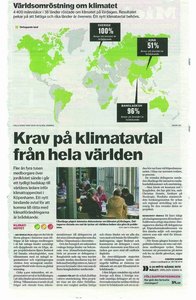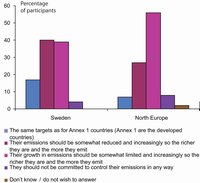The idea behind the project is that citizens across the world will have to live with climate change as well as with the decisions taken by world leaders at the COP 15 and thus it is fair to involve citizens in these deliberative processes. The Swedish partner in the World Wide Views alliance is Nordregio.
Nordregio chose to undertake the citizen consultation event in Borlänge in collaboration with the Municipal Council which had already displayed the ability to take concrete action in its climate change response plan. Fifty two citizens, led by facilitators, met in Borlänge to discuss in groups, and then individually vote on 4 different themes related to climate change and global warming.
The chosen themes are directly relevant to the COP 15 negotiations. All countries followed the same method for recruitment and deliberation, in order to be better able to compare the results between countries afterwards. The 4 different themes were as follows:
• Climate change and its consequences
• Long-term goal and urgency
• Dealing with greenhouse gas emissions
• The economy of technology and adaptation
The general conclusions demonstrate that the Swedish participants believe that climate change is an urgent and important question on the political agenda. Somewhat surprising however the Swedish results show that 100% of the participating citizens think that it is urgent to do a global climate deal at COP 15, and 100% think that Swedish politicians should sign the contract. The figures for Sweden's closest neighbours were broadly comparable while for the UK they were slightly less.
The level of knowledge among the participating citizens in Sweden as well as the level of concern regarding global warming is slightly higher as compared to the average for other northern European countries. In Sweden 52% of the participants knew a lot about climate change before joining WWViews, compared to the northern European average of 43%.
The same goes for the level of concern where 67% of Swedish participants are very concerned about climate change compared to the average of 50% in the rest of northern Europe. In Denmark only 27% of participants were very concerned.
Not surprisingly however, low income countries are much more concerned, with 86% of the participants being very concerned about climate change. One explanation here is that the consequences of climate change are harder to deal with in developing countries given the reality of less resources and infrastructure being available for adaptation.
When it comes to the question of justice and the distribution of resources worldwide the Swedish participants in general believe that countries that do not meet their commitments under a new climate deal should be subjected to a severe or significant punishment. In Sweden 61% of the participants thought the punishment should be severe compared to 48% globally and 51% in the rest of northern Europe.
Moreover, in general, Swedish participants were less understanding of the problems faced by the developing countries when compared to the northern European average, insisting that they should also significantly contribute to emission reductions, (see figure 1).
Perhaps even more interesting is the fact that participants among the least developed countries – such as Tanzania, Uganda and the Maldives - to a larger extent than participants from the northern European countries argue that the lower income developing countries should have the same emission targets as the developed ones. Among the participants in the least developed countries 19% voted for the above mentioned statement as compared to only 7% among northern European participants.
In addition, the Swedish participants think in general that all countries except for the least developed ones should be committed by a new climate deal to pay for climate change adaptation and the reduction of greenhouse gas emissions. 27% voted that all countries should be committed and 67% voted that all countries except the least developed ones should be committed to pay by a new climate deal. In Northern Europe the equivalent figures are 26% for all countries and 64% for all countries except for the least developed ones.
Somewhat surprising however the least developed countries voted similarly. Of the least developed countries 28% voted that all countries should be committed to pay and 56% that all countries except for the least developed ones should pay. What we can see in general is that participants in both the developed and the least developed countries have similar thoughts and ideas about who should contribute or not to a new climate deal.
At the end of the day there was an additional session that allowed each group, consisting generally of five citizens, to formulate their own recommendations for the COP 15 delegates. The recommendations which received most votes in each of the participating Nordic countries all mainly focus on climate change mitigation as compared to climate change adaptation (See box 1). Sweden and Denmark focus on the urgency of reducing greenhouse gas emissions, whereas Norway focuses on introducing fuel taxes which should be used to introduce a UN governed carbon fund. Finland focuses on the introduction of a carbon footprint calculation.
The results of the citizen consultation process in Borlänge and in all other countries will be presented to the world's decision-makers at the COP 15 through the Danish Minister of Climate and Energy – Connie Hedegaard – who is also the 'ambassador' for the project. World Wide Views on Global Warming consists of partners from
38 countries from all continents and is led by the Danish Board of Technology. The results of the consultations were instantly uploaded for comparison during the WWViews day and can be found on www.wwviews.org.
To conclude then, it is important to understand that when comparing results between different countries one should recall that even though all countries had the ambition to follow the same recruitment criteria, including participation from citizens with diverse demographic characteristics, the citizens that finally participated do not necessarily represent the opinions of the general public in these countries. Recruiting citizens that are indifferent or very sceptical to climate change is not an easy task and we can, at least in the Swedish case, state that such people were underrepresented. Finally the very small sample size used for each country again suggests that caution should be used in attempting to chart the significance of cross-national differences in responses which may in the end represent only very small differences in the number of votes cast.

The Swedish citizen exercise received good local and national media visibility. The national daily newspaper Dagens Nyheter (see above) reported several times from WWViews and initiated a public debate. More than 250 persons commented on the articles at www.dn.se

Figure 1: What do you think the short term target should be for lower income developing countries?
Quotes from the Nordic recommendations
Sweden: "Be brave! Take far-reaching and binding decisions regarding large emission reductions now!"
Denmark: "Reduce greenhouse gasses Now! Make all countries accede to an agreement on greenhouse gas reductions"
Norway: "Introduce international CO2 taxes on fossil fuels - taxes that among others will curb international air transport. The taxes should go to a UN-governed carbon fund."
Finland: "Carbon footprint on every product! Carbon footprint is calculated throughout the life cycle of products"